June 8, 2025 | 14:38 GMT +7
June 8, 2025 | 14:38 GMT +7
Hotline: 0913.378.918
June 8, 2025 | 14:38 GMT +7
Hotline: 0913.378.918
Toan Thang Import Export Trading Company Limited is one of the few companies in Dong Nai to invest in facilities that process and export durian fruit. Director Truong A Vung said, "Durian is often referred to as the "king" of fruits. The rich and sweet flavor of Dong Nai's durian is due not just to the land but also to the skilled hands of local growers."
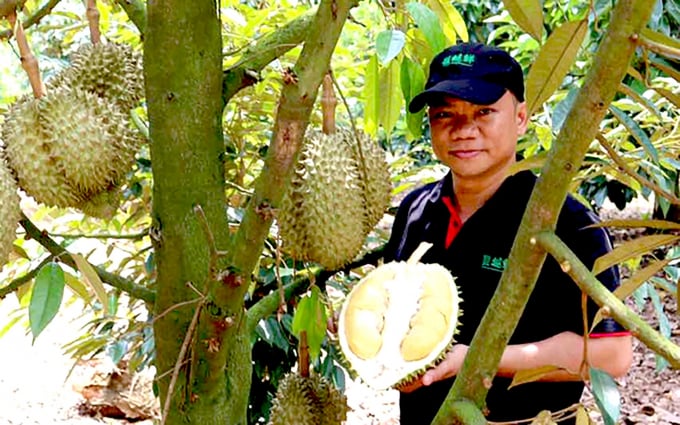
Mr. Truong A Vung inspects the processing area of durian materials for export to the Chinese market. Photo: Minh Sang.
Vung noted that the durian is the preferred seasonal fruit of both local and international customers. The company intends to increase production in order to supply consumers with this specialty fruit year-round. While frozen and processed durian products are more popular on international markets, processing would increase the value of fresh durian by two to three times.
Bui Quang Long, deputy director of Dona-Techno Biotech Development Joint Stock Company, shared a similar view, stating, "Our firm focuses on frozen durian aril for exports because of its enormous potential. Due to the fact that we master the processing, we are able to be more proactive in our production operations and prevent stagnation in the post-harvest durian."
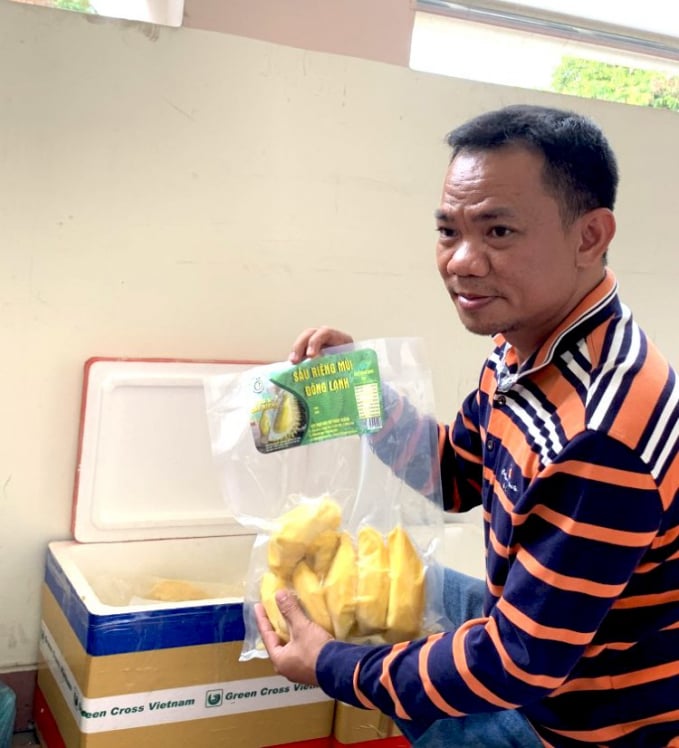
Toan Thang frozen durian. Photo: Minh Sang.
Investing in cold storage to preserve products after harvest and throughout processing is essential for the development of a big, stable, and professional agricultural production. Some businesses in Dong Nai have invested in cold storage to preserve products and reduce seasonal risk, hence enhancing the value of agricultural goods.
The factory of Nguyen Thi My Dung (Xuan Bao commune, Cam My district) has also invested in a cold storage system to freeze goods prior to their distribution to processing and exporting businesses. Simultaneously, she invested in increasing storage capacity to cut electric power usage and improve product quality preservation.
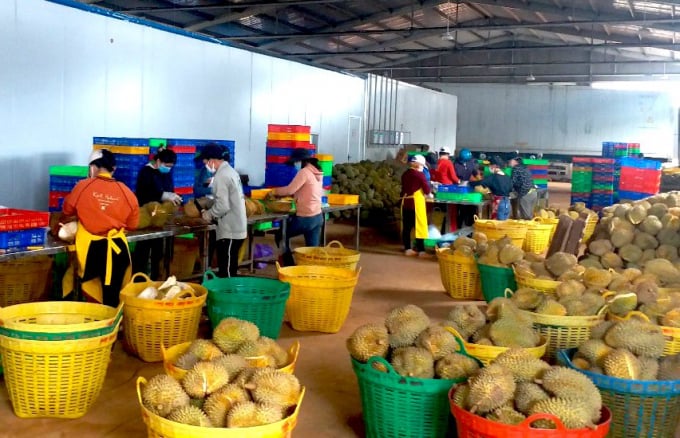
Preliminary processing durians. Photo: Minh Sang.
According to Dung, her facility includes five cold storage with an average capacity of four tons per unit. The investment in cold storage would enable the proactive supply of raw materials to offer frozen durian to exporters of fresh and dry confectioneries and beverages. Dung has extended the raw material area to the southern provinces and the Central Highlands in addition to procuring items in the Cam My district and nearby areas.
According to the Dong Nai Department of Agriculture and Rural Development, durian is the fruit with the greatest economic value.
According to the Deputy Director of the Department of Agriculture and Rural Development of Dong Nai Nguyen Van Thang, each hectare devoted to durian growth may yield hundreds of millions of dong every year for the gardeners. This is an impetus for farmers to increase production and area, as well as the quality of their produce, to meet the needs of corporations and export markets, especially China.
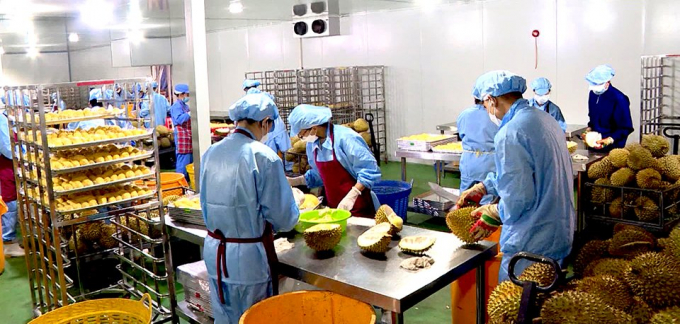
Preliminary processing and packaging of durian for export. Photo: Minh Sang.
At the same time, they also concentrate on maximizing the benefits of crop diversification to ensure that the export market is supplied with commodities year-round. These are also broad options for completing Vietnam's value chain, of which the country has several benefits. Specifically, the Chinese market of billions of people who import durian presents enormous prospects for durian-growing regions, notably Dong Nai, the "durian capital" of the Southeast region.
"We are now widely informing durian growers, producers, and trading businesses about the requirements of China; at the same time, we are strengthening guidance for growers to produce in accordance with VietGAP standards in order to be granted planting area codes, and we are assisting businesses to register for packing codes. China is no longer an easy market, therefore people must adhere to clean, safe, and organic manufacturing techniques to guarantee export requirements", Thang said.
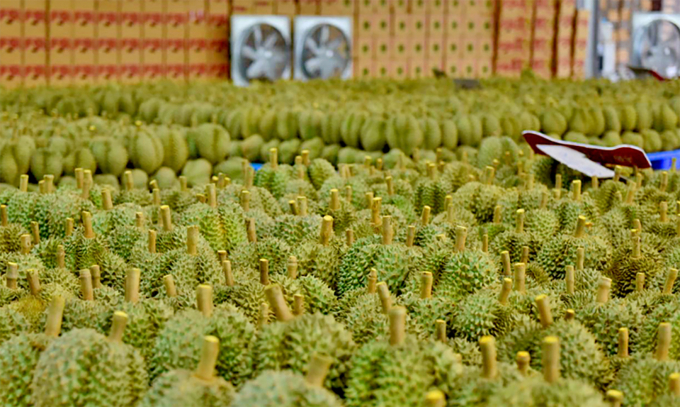
Some enterprises in Dong Nai province have invested in cold storage to preserve fresh fruit products and limit risks related to seasonal factors and improve the value of agricultural products. Photo: Minh Sang.
Additionally, Dong Nai is aggressively replicating the durian farming model in accordance with VietGAP criteria in order to get OCOP product certification. Current export markets for Dong Nai's frozen durian goods include China, Hong Kong, Taiwan, and Thailand. In addition to concentrating on the formal export market to China in the near future, local businesses are attempting to extend their export networks into high-demand markets such as Canada, the United States, and Japan, among others.
Translated by Linh Linh
/2025/06/05/5314-1-184727_407.jpg)
(VAN) From seemingly worthless fish scales and skin, enzymes and lactic ferments can transform by-products into peptides, opening a sustainable, effective business direction and elevating Vietnamese seafood.

(VAN) TTC AgriS and IFC signed a strategic partnership to develop a sustainable agricultural value chain, aiming to achieve the Net Zero target by 2035.

(VAN) Seafood by-products are opening a new path, combining green growth and technological innovation to enhance the industry's value.

(VAN) Mr. Nguyen Thanh Cong, Vice Chairman of the Son La Provincial People's Committee, reflects on Son La’s journey from barren hills to fruitful orchards after a decade of hard work.

(VAN) FAO’s Director-General addresses the 5th Baghdad International Water Conference.
/2025/05/26/1716-4-nongnghiep-191706.jpg)
(VAN) Chain linkages, technological innovation, and raw material zoning are three strategic pillars for the coconut industry to strongly develop and elevate its position on the global agricultural map.
![Advanced mariculture – an inevitable trend: [4] Accompanied by scientists](https://t.ex-cdn.com/nongnghiepmoitruong.vn/608w/files/sohk/2025/05/13/1941-pgsts-vo-van-nha-140958_717.jpg)
(VAN) According to Assoc. Prof. Dr. Vo Van Nha, Director of the RIA III, the development of advanced offshore mariculture is no longer an option but an essential path for Vietnam’s fisheries sector.